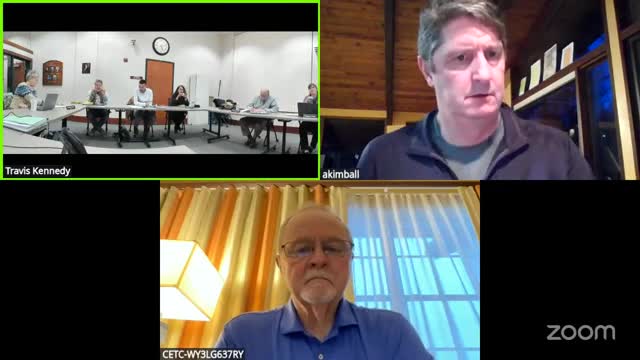Cumberland County finance panel recommends 2025 budget as presented amid jail revenue uncertainty
Get AI-powered insights, summaries, and transcripts
Subscribe
Summary
The Cumberland County Finance Committee recommended the county's 2025 budget to the County Commissioners after staff said federal detention revenues remain uncertain. Committee members discussed public-health grant funding, a reported $700,000 jail revenue shortfall last year and next steps before the commissioners' final vote.
Cumberland County finance officials recommended the county's 2025 budget to the County Commissioners following a meeting Tuesday evening where staff cautioned that federal jail revenues remain uncertain.
County Manager Jim Gail convened the Finance Committee at 5:11 p.m. on Tuesday, Jan. 21. Andrea (staff member) and Alex Kimball, deputy county manager, presented a staff budget update and answered committee questions about revenue assumptions, grant funding and potential carryover. After discussion, the committee made and approved a motion to recommend the budget as presented to the commissioners; the committee then adjourned at about 6:46 p.m.
The central uncertainty discussed at the meeting was jail revenue tied to federal partners. "It's just way too early," Andrea said of adjusting revenue estimates, adding that "with the uncertainty of the jail revenues, particularly from the U.S. Marshals Service and ICE ... we really don't have a clear understanding of where we sit." That uncertainty, staff said, is a factor in delaying any upward revenue adjustments in the draft budget.
Why this matters: county officials must present a final budget to the commissioners on Feb. 18. Staff noted a February 3 workshop with the County Commissioners as a nearer milestone that may provide additional information before final approval.
Key points from the discussion: - Federal detention revenue uncertainty: Staff reported that jail revenues, including receipts from the U.S. Marshals Service and Immigration and Customs Enforcement (ICE), were not yet stable enough to revise revenue estimates. Andrea said the county is monitoring news and internal communications that could affect participation and payment levels. - Prior-year jail revenue loss: Staff said the county lost about $700,000 in jail revenue during the prior fiscal year, a figure cited as a driver of budget pressure. - Grants and public health funding: Committee members and staff discussed the county's public health staffing model. Andrea said public health growth would rely largely on external grants rather than general-fund support and noted the county is in year two of a 10-year state public-health grant that provides a baseline of funding. - Carryover and capital projects: Staff explained that when carryover appears, it is typically routed toward capital projects or one-time costs rather than recurring expenses. During the pandemic the county used carryover to offset next year's capital needs, staff said. - County/town collaboration and consolidation: Several committee members urged the county to continue exploring regional collaboration and consolidation of back-office services (assessing, animal control and other administrative functions) to reduce local costs. Town representatives on the call recommended stronger two-way communication with towns and with the Maine Municipal Association to shape legislative priorities. - Efficiency and technology: Committee members discussed potential efficiency gains from technology, including generative AI, to streamline paperwork and citizen-facing processes and to visualize consolidation cost savings for mutual-aid or shared-service proposals.
Formal action: the committee made a motion to recommend the budget as presented to the County Commissioners and the motion passed by voice vote. The committee's recommendation does not finalize the county budget; the County Commissioners will consider the recommendation and are scheduled to take final action on Feb. 18.
Committee members also requested additional follow-up materials and noted staff would circulate answers to questions submitted in advance. Staff said they will continue to monitor federal detention revenue developments and report back at the Feb. 3 workshop and again before the commissioners' February meeting.
The committee thanked staff for their work on the draft budget and for responding to pre-meeting questions. The meeting concluded with procedural motions to adjourn.
